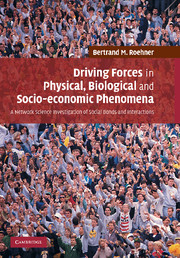 Driving Forces in Physical, Biological and Socio-economic Phenomena
Driving Forces in Physical, Biological and Socio-economic Phenomena Published online by Cambridge University Press: 02 December 2009
The central theme of this book is the analysis of interactions in social systems. As a first (and perhaps easier) step we will study the consequences of a lack of interaction between social agents. For instance, what happens when there are no interactions between landowners and tenants, holding companies and employees, governments and subjects? These questions might seem fairly difficult, but fortunately we have a good starting point because we can rely on the results of a famous experiment performed by Stanley Milgram in the 1960s.
First of all, to introduce the issue of absentee ownership, we describe landownership in the Philippines and Japan as seen by General Douglas MacArthur.
Land reform in Japan under General MacArthur
After General MacArthur retook Luzon in March 1945, some of his officers suggested that he send a punitive expedition against the Huks who were waging a guerrilla war in Central Luzon to dispossess the landlords. He refused and justified his position in the following way (Manchester 1978, p. 420).
Tarlac [located 100 kilometers to the north-west of Manila] marks the border between the sugar economy and the rice country. North of them the people grow rice and most of them own small areas of land. Did you notice how many schools there are up there, how the people dressed, looked happy? Do you see the hangdog look they have here, resentful, poorly dressed? Most of this land is owned in Madrid or Chicago or some other distant place. This is really absentee ownership. No pride, few schools, little participation in government. This is where organizations like the Hukbalahaps are born and get their strength. […]
To save this book to your Kindle, first ensure [email protected] is added to your Approved Personal Document E-mail List under your Personal Document Settings on the Manage Your Content and Devices page of your Amazon account. Then enter the ‘name’ part of your Kindle email address below. Find out more about saving to your Kindle.
Note you can select to save to either the @free.kindle.com or @kindle.com variations. ‘@free.kindle.com’ emails are free but can only be saved to your device when it is connected to wi-fi. ‘@kindle.com’ emails can be delivered even when you are not connected to wi-fi, but note that service fees apply.
Find out more about the Kindle Personal Document Service.
To save content items to your account, please confirm that you agree to abide by our usage policies. If this is the first time you use this feature, you will be asked to authorise Cambridge Core to connect with your account. Find out more about saving content to Dropbox.
To save content items to your account, please confirm that you agree to abide by our usage policies. If this is the first time you use this feature, you will be asked to authorise Cambridge Core to connect with your account. Find out more about saving content to Google Drive.